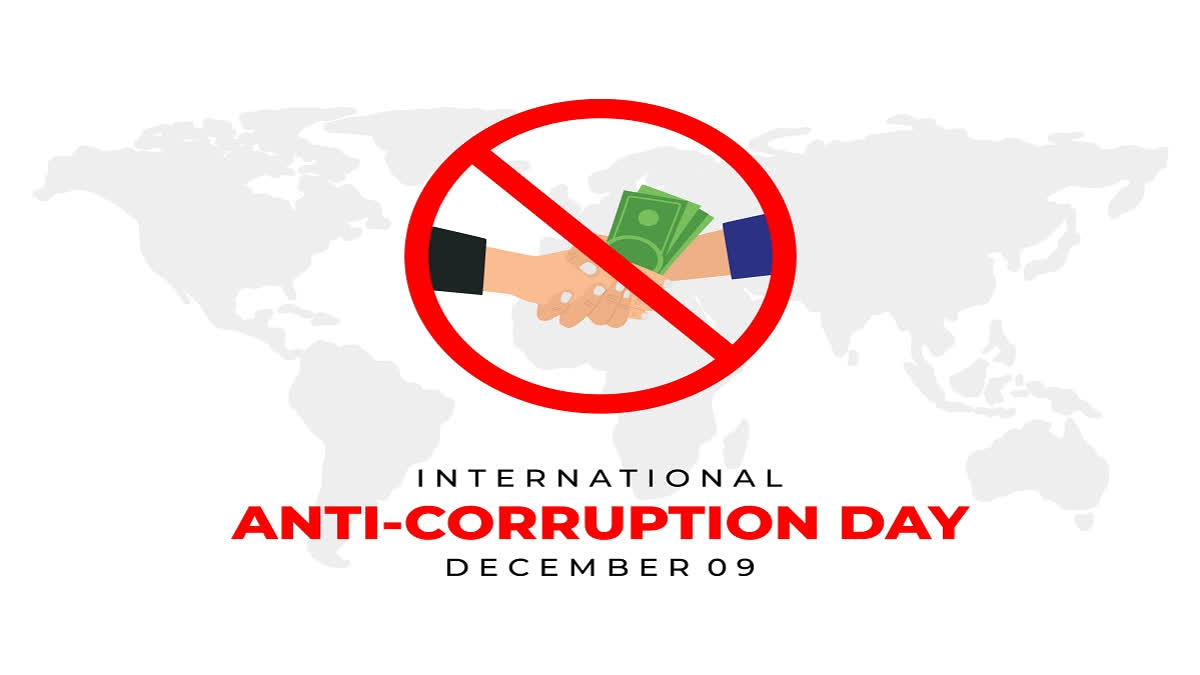Hyderabad: Every year on December 9, the world observes International Anti-Corruption Day, which serves as a symbol of solidarity uniting all nations in their fight against this evil. Corruption, an insidious affliction, remains a persistent global challenge, eroding the foundations of society and governance. This year marks the 20th anniversary of the United Nations Convention against Corruption (UNCAC)
History- The origin of International Anti-Corruption Day can be traced back to the adoption of the United Nations Convention against Corruption (UNCAC) by the UN General Assembly in 2003, designating December 9 as a day to create awareness about corruption and promote UNCAC's role in its prevention.
Theme: The theme for the 20th anniversary of the UNCAC against corruption is UNCAC at 20:Uniting the World Against Corruption
Why is it Observed? On this day, the world is reminded once again of the critical connection that exists between anti-corruption efforts and the development, peace, and security that are the cornerstones of society's progress. It emphasises how urgently anti-corruption efforts are needed to promote just, stable, and prosperous societies around the world.
Impact of Corruption- With up to 25% of the projected US$13 trillion spent on public spending going to corrupt activities, corruption poses a serious threat to society. According to estimates provided by the United Nations Development Programme (UNDP), governments spend $7.5 trillion on health care each year, of which $500 billion is lost annually. These funds could be used to support public health, governance, education, and other areas where corruption has a negative impact.
Corruption in India- Indian bureaucracy, public services, and politics are all affected by widespread corruption. This widespread problem damages public trust in institutions, obstructs effective governance and diverts funds intended for the general welfare.
Urgent need to stop corruption- It is crucial to put an end to corruption. Beyond monetary losses, corruption weakens public confidence, promotes inequality, and blocks access to justice. Corruption must be eradicated to ensure social justice, grow the economy, promote open and accountable governance, and create an atmosphere that is favourable to sustainable development.
Effects of corruption- Corruption has a wide range of effects. While some of these impacts are easily understood, others require explanation. Some of them are:
Undermining the sustainable development goals- The Sustainable Development Goals (SDGs) of the United Nations are hampered by corruption. The SDGs are all-encompassing, therefore it is not surprising that corruption may undermine them. After all, "a better and more sustainable future for all" frequently conflicts with the interests of a select few and can be thwarted by a variety of corrupt practices.
Economic loss and inefficiency- While exact estimates of the financial repercussions of corruption are hard to come by, the International Monetary Fund (IMF) estimated in a 2016 report that the annual cost of bribes alone was between $1.5 and $2 trillion. This amounts to a total loss of about 2% of the world's gross domestic product. However, it ignores the financial toll that all other types of corruption have.
Poverty and inequality- The weak usually do not use corruption as a weapon. Global Witness (2017) reports that a well-known bribery case in Nigeria involving the multinational oil corporation Shell cost the Nigerian people more than $1.1 billion since the funds were diverted to corrupt officials rather than the national budget. Around 50% of people in the oil-rich countries, however, live in extreme poverty, according to the World Bank (2019).
Personal loss, intimidation and inconvenience- It is rare for anyone to have a pleasant experience with corruption. To receive medical care, get a building permit, pick up a package, or use phone services, you have to pay a bribe. A court may find against a party not because of the merits of the case, but rather because the other side is related to the same race or ethnicity, has ties to a powerful person, or paid bribes. When someone declines to pay a bribe that a police officer has requested, they risk being physically assaulted, being arrested, or receiving a larger fine. Retirement savings are embroiled in money-laundering schemes or lost to scammers.
Public and private sector dysfunctionality- Dysfunction is the result of multiple corrupt actions taken individually. The quality of products and services declines, regardless of whether they are provided by the public or private sectors, and the process of acquiring them becomes more costly, time-consuming, and unjust. If it is possible to successfully bribe law enforcement, medical professionals, and government employees, then those who are best at obtaining these payments will benefit at the expense of more honourable associates and rivals who might perform better based on merit.
Impunity and partial justice- A corrupt legal system makes it impossible for the public to trust judges and prosecutors to carry out their duties. Justice can evade the powerful. Additionally, people may be intentionally accused of crimes, denied due process, and wrongfully imprisoned. This is most likely to happen to those with limited means or strong connections.
Rising illiberal populism- According to a 2017 TI report and several academic studies, corruption plays a role in the rise of authoritarianism. corruption causes escalating levels of frustration and hardship among citizens, who are therefore more prone to tolerate (or even demand) harsh and illiberal measures. It also reduces popular accountability and political responsiveness.
Public frustration and cynicism- When people believe that corruption is widespread and that those who engage in it are not being held accountable, they begin to lose faith in public institutions, leaders, social structures, and occasionally even society and ethics itself. Political participation declines and such impressions last for extended periods when political non-accountability rises. People may be influenced by societal norms to engage in corrupt behaviour because they believe that "if everybody is doing it, I might as well do it too." In Köbis (2018).



